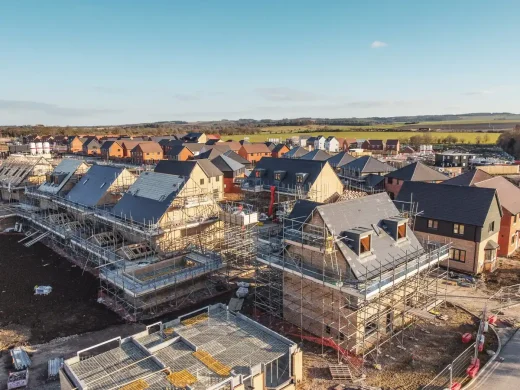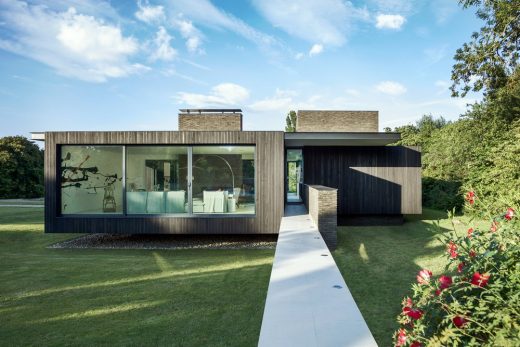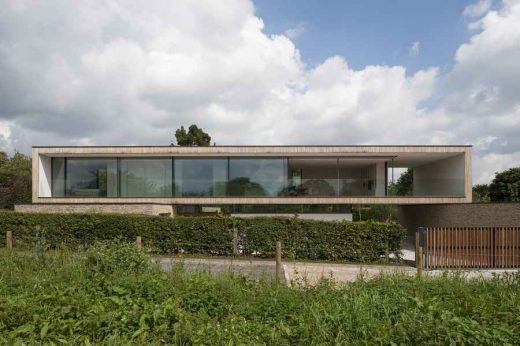New British homes, England property trends, United Kingdom building insulation, House Price Index
New UK Housing: Housebuilding News
UK Residential Property Expansion + Housebuilding Issues: new home buyer searches data
post updated 24 January 2025
Legal Comment: PM To Curb Blocks On UK Infrastructure Projects
News today reveals that the government has pledged that major infrastructure projects will be built faster under new planning rules.
Tom Barton, partner in the Planning team at Mishcon de Reya, said:
“Any reforms which will speed up the delivery of major projects are welcome. While the right to challenge is sacrosanct, it can certainly be argued that at present the law is tilted too far in favour of those wishing to stall development. It is fantastic to see Lord Banner using his knowledge and insight as a practising planning lawyer to inform and drive change through his position in the Lords.
“As a country we desperately need to take action to deliver major projects to drive growth – these reforms would be a step towards doing so.”
Another recent UK building article:
4 January 2025
UK Housing Construction Costs
UK government ignoring construction costs and threatening housing delivery
Commenting on how the UK government is overlooking construction costs, damaging UK housing delivery, Daniel Austin, CEO and co-founder at ASK Partners, said: “Government initiatives such as the 95% mortgage guarantee scheme and £5bn allocation for new homes are clearly positive initiatives.
However, a critical issue remains overlooked: the cripplingly high construction costs that severely limit the number of projects that can be completed.
While the planning process also garners attention, there appears to be little consideration of how to support the housebuilding industry through these financial pressures. If construction projects continue to stall due to steep costs and an imbalance between delivery expenses and expected sales, land will increasingly lose its appeal for builders and investors, further exacerbating the housing crisis.
“The rise in construction costs is as damaging to housing delivery as fluctuating market sentiment and rising interest rates. Compounding this, the government has introduced measures such as the Building Safety Act and ESG requirements. While these initiatives are much-needed, they add significant cost pressures to builders’ portfolios, costs that many cannot sustain, ultimately risking projects being abandoned.
“To address the housing crisis, the government must consider the broader impact of rising costs on the entire market. A holistic approach is needed and one that ensures financial viability across small, medium, and large-scale developments. One solution would be targeted financial support for the housebuilding sector, which could help make construction manageable again. Without such support, delivering on their promise to build one and a half million homes becomes increasingly unlikely. By tackling this issue head-on, the UK can reinvigorate its real estate sector and work towards a sustainable resolution to the housing shortage.”
14 November 2024
Autumn Budget Misses Mark on Housing Reform: UK Rental Market Squeezed by Shortages and Rising Rents
Tenant demand remains high as Rics index shows 19% rise, while rental supply drops to -29%
The UK rental market faces mounting pressures, with a recent Rics survey revealing a critical shortage of properties and surging rent prices. Landlord instructions, a key indicator of properties available to rent, fell to a net balance of -29%, marking this the lowest level since 2021. Strong tenant demand is driving rents higher, with 33% of surveyors expecting further increases. While some banks have eased mortgage rates, renters continue to feel the strain, as new tenancy rents now consume 30% of household income. David Hannah, Group Chairman of Cornerstone Tax, highlights the implications of recent tax reforms, pointing to the government’s Autumn Budget as a missed opportunity to support the housing market. The Budget’s 2% rise in the second home surcharge, coupled with recent stamp duty hikes for landlords, has further constrained rental stock, exacerbating tenant affordability challenges
Annual rent growth peaked at 9.2% in March, the highest rate since records began in 2015, before slightly easing to 8.4% in September, according to official figures. Data from PriceHubble, published by the Office for National Statistics in October also highlights that rent on new tenancies costs renters 30% of their gross income, the highest share recorded since 2017. Meanwhile, house prices continue to climb, supported by expanding buyer demand for four consecutive months, signalling strong interest in homeownership despite difficulties in the rental sector.
David argues the Chancellor’s latest step will discourage second home ownership, aiming to create more opportunities for prospective homeowners. Another stamp duty change from the Labour government – the end of the temporary nil rate increase in April – is expected to drive a surge in transactions in early 2025, as buyers rush to complete purchases before the new tax rate takes effect, followed by a predicted slowdown in activity.
David Hannah, Group Chairman of Cornerstone Tax, comments:
“The decision from the government to lower stamp duty bands shows a concerning deficit of joined-up thinking. Does this Chancellor and Prime Minister not understand that if they want 1.5 million new homes, they cannot drive landlords out of the market, incur additional charges for first-time buyers and freeze up working capital for developers – which can only be available if these homes are selling. I expect stamp duty receipts to fall significantly, then to flatline in Q1 2025, potentially plunging the British property market into a desperate situation. In essence, reducing stamp duty thresholds means that it will ultimately be the consumers who foot the bill.
“Furthermore, it would make sense for the new Government to suspend, or even abolish, the 3% surcharge where properties are being acquired for private rental sector investment. Removing this measure would encourage landlords to increase their holdings, rather than exit the market – reversing the decline in supply of rental homes and potentially expand it to the point where demand no longer outstrips supply.”
30 October 2024
New UK Affordable Housing News
UK affordable housing boost
The supply of affordable housing is set to increase under provisions in the Autumn Budget 2024, UK Chancellor Rachel Reeves says.
The government will reduce Right to Buy Discounts. Local authorities, meanwhile, will retain receipts from the sale of any social housing so that it can be reinvested into their existing stock and new supply.
Government to invest £5bn for house building
The chancellor says the government will invest more than £5bn to deliver their housing plan.
She says this Budget will increase the Affordable Homes Programme to £3.1bn, provide £3bn worth of support and guarantees to increase the supply of homes and support small housebuilders.
She promises to provide investment to renovate sites across the country – including at Liverpool Central Docks – to deliver 2000 new homes.
post updated 16 October 2024
UK House Price Index for August 2024
Please find comment below on today’s UK House Price Index for August 2024.
The latest index shows that:
• The average UK house price has increased by +1.5% MoM from £288,533 in July 2024 to £292,924 in August 2024, while the latest annual change for August 2024 sits at +2.8%.
• The latest UK figures show consecutive increases in price over the last six months, from March 2024 (£279,017 and +0.3% MoM) to August 2024 (£292,924 and +1.5% MoM).
• When considering annual change, the UK figures show consecutive growth for the last six months, from March 2024 (279,017 and +0.4% YoY) to August 2024 (£292,924 and +2.8% YoY).
Lomond CEO, Ed Phillips, commented:
“A sixth consecutive month of positive house price growth demonstrates that the UK property market is very much heading in the right direction, boosted by a growing level of buyer confidence and an increased willingness to transact.
Whilst interest rates remain a factor, we’re likely to see further cuts before the year is out and this will only strengthen the momentum that has been building across the market in 2024.”
Director of Benham and Reeves, Marc von Grundherr, commented:
“Summer may have come and gone, but the green shoots of increased buyer activity that have been sprouting for much of the year are now starting to blossom into robust transaction volumes and consistently positive rates of house price growth.
Whilst we’re unlikely to see any sales market incentives delivered in this month’s Autumn Statement, the housing market is likely to march on undeterred and we’re set for a very strong end to the year, despite the usual seasonal lull that comes with the Christmas period.”
CEO of Yopa, Verona Frankish, commented:
“August brought the first interest rate cut in over four years and it’s clear that this boost to buyer sentiment has had an almost immediate impact on the UK property market, with house prices rising notably throughout the month.
Not only have we seen consistent improvements on a monthly basis, but this is the six month in a row that house prices have increased on an annual basis. This longer term metric is a far more reliable measure with respect to the returning health of the UK property market and bodes very well for the remainder of the year .”
Previously on e-architect:
post updated 23 September 2024
Reaction to Rachel Reeves’ speech from planning lawyer
Rachel Reeves has highlighted planning reform in her speech to the Labour Party conference today, vowing to ‘rip out the blockages’ in the cuurrent system.
Fergus Charlton, planning partner at national law firm Michelmores comments:
“Understandably the Chancellor has dipped lightly into the world of planning in her speech to conference. ‘Ripping out the blockages’ of a system that places great value on community consultation and which turns on both local and national level political decision taking, suggests that the Chancellor is inclined to extend permitted development rights. Such rights typically avoid consultation and constrain the ability of a politically driven decision maker to say ‘no’.
“This would be consistent with the direction of travel signalled over the weekend by the Ministry of Housing, Communities & Local Government’s planning reform working paper that is proposing ‘brownfield passports’ akin to permissions in principle, and which also extols the use of Local Development Orders.”
+++
Get Britain Building Again
Addressing the Labour Party Conference in Liverpool today, Chancellor Rachel Reeves reiterated the Labour Government’s promise to “get Britain building again.”
The Chancellor also pledged to make improvements to the planning system, in a bid to support “builders frustrated by a system that hands power to the blockers.”
Vowing to “rip out the blockages” in the current system, Reeves said that the Labour Government aimed to increase building and introduce new infrastructure across the UK, echoing back to its campaign promise to build over 1.5 million homes this Parliamentary term.
Alun Williams, partner at London law firm Spector Constant & Williams said: “The chancellor is another in a long line of politicians who appears pretty adept at identifying the illness plaguing the planning system. The question is whether Labour will be the first to successfully administer a cure.”
Kingsgrove Housing Development, Wantage, Oxfordshire, England:

Previously on e-architect:
9 July 2024
Engineering experts: planned 1.5 million new homes are an opportunity to embrace low-carbon regenerative design
Directors of the University of Bath’s Centre for Regenerative Design & Engineering welcome new housebuilding plans
Following the announcement by Chancellor of the Exchequer, Rachel Reeves, that the new government plans to build 1.5 million homes in England over the course of this parliament, University of Bath experts say the initiative presents a major opportunity to adopt low-carbon and regenerative design for the future.
Professor Sukumar Natarajan and Dr Juliana Calabria Holley, Co-Directors of RENEW, Bath’s Centre for Centre for Regenerative Design & Engineering for a Net Positive World, commented:
“The promise to build 1.5 million new homes is both welcome and urgently needed. As a society, we are essentially committing to produce new homes at a rate not seen since the second world war. Such a step change in housing provision should not only learn from the mistakes of the past, where speed triumphed quality, but embrace a planet-positive future. That is, we need to design dwellings through a process of co-creation with the entire spectrum of stakeholders.
“Homes should have good space standards and be designed to adapt and expand with the generations. They should not only be climate resilient but also contribute positively to society and the planet. In short, this is a massive opportunity to embrace a regenerative design and engineering paradigm.”
RENEW carries out leading global research in ’beyond Net Zero’ regenerative design and engineering, developing solutions with societal, cultural, ecological, and economic co-benefits.
Previously on e-architect:
5 July 2024
Labour UK Housebuilding Agenda
The Labour Party has secured a landslide victory in the General Election and will form the new UK government after 14 years. David Thomas, Chief Executive of Barratt Developments, emphasises the importance of building new homes, assisting first-time buyers, and promoting sustainable living for the new prime minister’s agenda.
David Thomas, chief executive of Barratt Developments, said:
“The country urgently needs more new homes, of all types and tenures. We look forward to working with the new government to help them build 1.5m homes across the next parliament, unlocking planning and helping first-time buyers access affordable finance, ultimately helping more families own a high quality, sustainable, new home.”
1 July 2024
Comment on Labour’s proposed housebuilding blitz (if elected)
Commenting on how Labour plan a housebuilding blitz in the first few weeks if elected this week, Daniel Austin, CEO and co-founder at ASK Partners, said: “Housing stands as a pivotal issue in the election fray, given its correlation with economic stability. Recent upticks in house prices and mortgage approvals hint at recovery, yet the persistent housing shortage threatens prolonged recession. The UK faces a crisis of affordability due to insufficient homes for rent and sale, negatively impacting GDP.
Decades of social strain persist with little resolution in sight. We urge the implementation of a radical yet credible long-term plan to assuage market concerns. Their proposed target of 300,000 homes annually echoes longstanding government aspirations unmet since 2004.
France’s surpassing construction efforts underscore the urgency, with Capital Economics estimating a need for 385,000 new homes yearly. Four primary factors underpin this crisis: over-reliance on major housebuilders, politicised planning discouraging development, net loss of social housing, and post-Brexit labour shortages.
Addressing these roots is imperative to alleviate the affordability crisis. Reinvigorating SME housebuilders is pivotal. Incentives should facilitate access to opportunities, including allocating small land plots for development and streamlining planning permissions for brownfield sites.
Boosting skilled labour domestically and reforming the planning system are equally crucial. Independent decision-making and private sector assistance can expedite approvals and reduce costs. Prioritising social housing and incentivising brownfield developments are essential steps toward sustainable growth. Lenders must offer flexible financing to smaller developers.
Despite potential temporary unpopularity, a steadfast commitment to a pro-growth agenda is necessary. The unique challenges facing the UK demand decisive action. Embrace this opportunity to steer us toward a balanced and sustainable housing market, ensuring prosperity for generations to come.”
28 June 2024
UK homes with planning permission left unbuilt
More than a million homes with planning permission left unbuilt since 2015:
UK homes with planning permission left unbuilt
post updated 13 June 2024
How Labour’s New Policies Echo VELUX’s Commitment to Sustainable Housing
This morning the Labour Party released their party manifesto for the upcoming general election and as the world increasingly turns its attention to sustainability and climate resilience, the recent announcement of Labour’s manifesto has brought renewed focus on housing and environmental policies.
VELUX are pleased to see Labour’s dedication to these critical issues, particularly their ambitious goals for achieving net zero emissions, plans to build more sustainable homes and creating places that increase climate resilience and improving housing standards. The alignment of Labour’s policies with VELUX’s vision is a promising development, but it also highlights the urgent need for continuous action and innovation.
Alex O’Dell, Vice President of VELUX GB&I has stated:
“The UK’s buildings are, on average, old, inefficient and not particularly healthy. The next Parliamentary term brings the chance to overhaul the UK’s housing sector and create homes that are suitable for the next generation of homeowners and residents.
VELUX welcomes Labour’s proposed plans to promote the building of 1.5 million high-quality, sustainable and affordable homes. We also welcome the Conservatives’ plans for ‘brownfield presumption’ to accelerate planning permission at councils where housebuilding targets have not been achieved.
VELUX also welcomes Labour’s proposed plans to ensure buildings are well-designed and that sustainable housing is created to better meet the needs to become climate resilient.
Whichever political party wins the election, we urge the next housing secretary to devise a strategy that not only stipulates the number and locations of homes to be built, but also factors in the need for properties to enhance householders’ physical and mental well-being. By prioritising building design and renovation that improves ventilation, indoor air quality and natural daylight, UK residents’ quality of life can be significantly elevated, leading to better physical health and mental well-being.
At VELUX we strongly believe that all buildings should address climate goals and foster a healthy indoor environment. Our annual research into Europe’s building stock shows how policymakers and the building sector more broadly must re-think their approach to building to create a better future for all.”
post updated 21 May 2024
RIBA welcomes Labour measures to deliver new homes
UK Housing Plan by Labour
The Royal Institute of British Architects (RIBA) has today (Tuesday 21st of May 2024) responded to the UK Labour Party’s proposed measures to deliver new housing if it wins the upcoming general election. Angela Rayner MP, Labour’s Deputy Leader and Shadow Housing Secretary, made the announcement in a speech at the UKREiiF conference in Leeds today.
RIBA President Muyiwa Oki said:
“Given the scale and complexity of the housing crisis, commitments to deliver new well-designed, high quality and sustainable homes and places at scale are welcome.
Architects stand ready to design the millions of high quality affordable new homes required and, as today’s announcement acknowledges, we will prioritise access to green spaces, transport, and social infrastructure such as schools and hospitals – all vital for people and places to thrive.
Delays in the planning system have held up necessary development for too long. Measures to unlock brownfield and grey belt land and work alongside local leaders, to speed up delivery of homes where they are needed most, is a vital step.
But to make this happen, the Government must comprehensively resource local planning departments with the skills and expertise needed to ensure all new homes are up to standard.
Today’s plan outlines some positive first steps. We will work with whomever forms the next Government to deliver the homes we deserve.”
United Kingdom Housing Market Plan by the Labour Party
Today’s speech by Angela Rayner sets out Labour’s plan for the UK’s housing market if they are elected to Government at the next general election. As she sets out to rightly emphasise, the UK faces a critical need for high-quality, sustainable housing solutions that address both environmental concerns as well as the well-being of their residents.
VELUX, has been advocating for these changes for many years through their Healthy Homes Barometer. The needs for homes that not only protect the outdoor environment but also create a healthy indoor environment cannot be overstated and any Government should make this a key priority.
Alex O’Dell, Vice President GB&I for VELUX, having seen Angela’s speech has stated:
“VELUX welcomes Labour’s proposed plans to promote the building of high-quality, well-designed and sustainable affordable housing as announced today. This initiative aligns with our Healthy Buildings Barometer, which emphasises the importance of creating living spaces that enhance both physical and mental well-being. VELUX strongly advocates that it’s time we start planning more homes and buildings that not only enhance the external environment but also foster a healthier indoor environment. By prioritising housing designs that improve ventilation, indoor air quality and natural daylight, we can significantly elevate the quality of life for residents, leading to better physical health and enhanced mental well-being.”
+++
New UK Housebuilding – United Kingdom Housing Archive for Winter to Spring 2024
UK Housebuilding News – Housing News in 2023
+++
Previously on e-architect:
United Kingdom Residential Property
Recent UK housing news on e-architect:
UK brownfield land for affordable MMC housing
Bracknell Town Centre Regeneration
Make Modular: UK Housing Delivery
New UK homes for the North and Midlands
Too little, Too late? Housing for an ageing population
++
Interesting link:
Imber village on Salisbury Plain under control of the Ministry of Defence
UK Housing Links:
English Architecture:
English Architecture Designs – chronological list
Location: UK
Contemporary British Homes
Recent British Home Designs
Black House, Kent, Southeast England
Architect: AR Design Studio

image courtesy of architects
Black House in Kent
A House for Essex, Essex, Southeast England
Design: FAT Architecture and Grayson Perry

photograph : Jack Hobhouse
A House for Essex
Balancing Barn, Suffolk, Southeast England
Design: MVRDV

photo : Living Architecture
Balancing Barn Suffolk
, Buckinghamshire, Southern England
Design: John Pardey Architects with Ström Architects

photo : Andy Matthews
Buckinghamshire Property
Contemporary North European Homes
Recent North European Houses
Comments / photos for the New UK Housing Shortage – Current British Housebuilding page welcome





